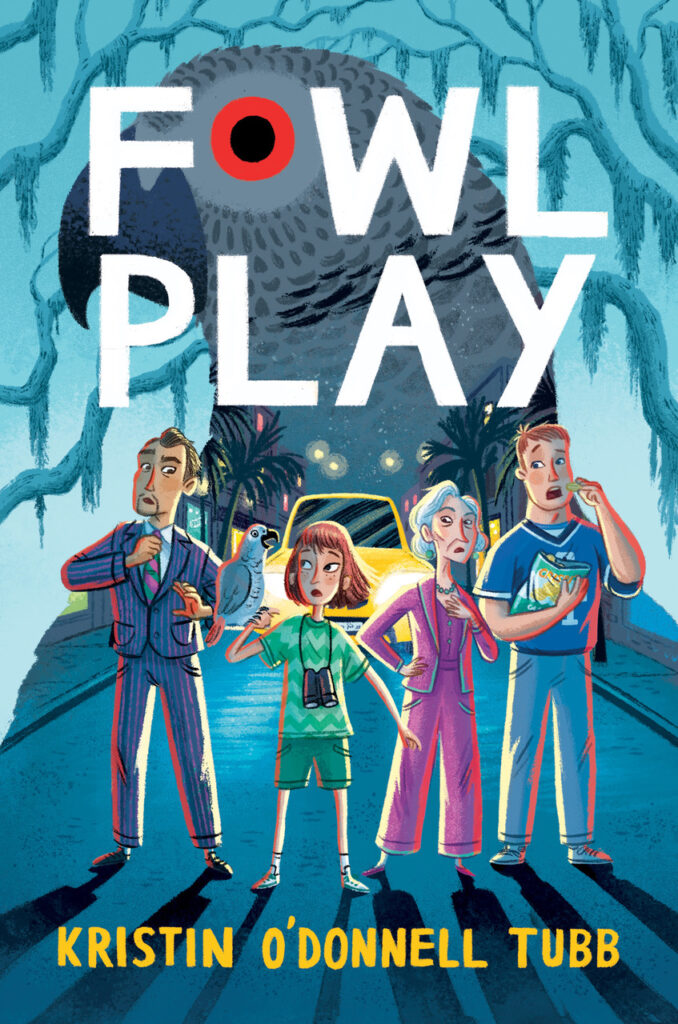Kristin O’Donnell Tubb, a celebrated author of middle-grade novels, has a remarkable ability to weave stories that touch on deep emotions while keeping young readers engaged. Her latest book, Fowl Play, explores the theme of grief through a mystery that is both heartwarming and humorous. Inspired by her own experiences and the love she has for her craft, Kristin uses her stories to help young readers navigate complex feelings and find comfort in the power of connection. Her work not only entertains but also empowers, making her a guiding light for children and adults alike.
- What inspired you to write Fowl Play, and why did you choose to explore the theme of grief for middle-grade readers?
I originally set out to write a book about starlings, those quick, cute little birds who fly in amazing, undulating murmurations. But as cool as those flocks are, starlings themselves aren’t very interesting as main characters (sorry, starlings!). But, I thought, what if the bird was instead parrot? Who, after inherited, started squawking phrases like “Call 911!” and “It was poison!” The story – now a mystery – came together very quickly after that.
“Inherited” became a key phrase in that idea. Chloe, the main character, inherits Charlie the parrot from her favorite Uncle Will, who passed a few weeks earlier. Grief is an important theme to explore with young readers; literally everyone experiences it at some point. I think adults forget that so often – the emotions kids feel are real, and big, and the more kids can read about them and experience them in the safety of story, the less alone and better prepared they’ll feel.
- Can you share a personal experience with grief that influenced your writing of this book?
My dear friend Kate Dopirak passed away from a rare degenerative brain disorder, Creutzfeldt-Jakob disease, in 2018 at 43 years old. She lived in Pennsylvania, and I live in Nashville, so while we chatted often, I only got to see her once or twice a year. I didn’t know the last time I saw her would be the last time I’d ever see her; her illness took her from us so swiftly, over the course of just a few months. I thought of her a lot in writing Fowl Play; one of the themes of the book is not being able to say a proper, heartfelt, loving goodbye. Questioning why, and why her? Feeling like it couldn’t possibly be real, because she was so full of light and laughter just weeks ago. But Fowl Play is also about healing alongside your loving family, and it’s full of goofy, funny moments, too. I feel like I can see Kate’s amazing smile in those parts most of all; no one could light up a room with their laughter more than Kate.
- How do you approach writing about sensitive topics like grief in a way that is both accessible and engaging for young readers?
Grief looks different for every person, and honestly, can look different in the same person from one day to the next. Likewise, coping with grief varies widely. In Fowl Play, I hope that kids see managing and coping with grief takes many forms, including humor and togetherness. Humor takes heavy situations and lightens their load, allowing us to see things with a bit of levity. But togetherness – grieving with others and sharing your memories, your feelings? That’s where true, beautiful healing occurs.
- How has the process of writing and promoting this book affected your own mental health and perspective on grief?
Writing Fowl Play has reminded me that the only way out is through. We must feel our emotions deeply, we must confront them and perhaps even befriend them, in order to lighten our load. And that the best way to do that is by connecting with others who are trustworthy and loving and supportive.
- Can you describe a moment when you felt particularly proud of your work on Fowl Play?
Fowl Play has been very well-received in the publishing world, I’m delighted to say. It’s received two starred reviews (thank you, Publisher’s Weekly and ALA Booklist!) and it was named a Junior Library Guild Gold Standard Selection, which means it will be in the hands of a lot of librarians who might not have discovered it otherwise. The true test will be, of course, whether young readers gobble it up (I certainly hope they do!); since this book is only a few weeks old currently it’s just now finding its way into young readers’ hands. But it’s so nice to know that my peers appreciate what I was trying to do in this story.
- What advice would you give to young readers who are struggling with their own feelings of grief or loss?
Grief is a feeling, an emotion like joy or wonder or sadness or anger. We all feel it, every last one of us, at some point in our lives. Like all feelings, grief will fade at times and be stronger in others. And like all feelings, we usually don’t know how or when that will happen. We just need to identify it for what it is, when we’re feeling it.
I think knowing that everyone feels grief and loss helps us remember to seek out supportive and trustworthy friends and family who can walk with us while we’re feeling it. And I think reframing grief as a feeling helps us remember that it comes and goes in waves. It still hurts – a whole lot, grief hurts – but I do think it helps knowing that it will eventually loosen its grip and that others can ease the hurt.

- How do you stay motivated and inspired while working on your writing projects, especially when facing creative or personal challenges?
I’m so glad you asked this question; I need this reminder myself because currently I’m in my Procrastination Era. Honestly, for me, the answer is: Do The Work. Consistently and earnestly. Even when you don’t want to. Especially when you don’t want to. Chip away at the project, even if it’s just a handful of words each day. Sometimes it’s…not good. But sometimes, even when I’m forcing myself to put words on paper, it surprises me. Sometimes it delights me. And that’s like magic, isn’t it? Sparking joy for yourself, simply by creating. But you don’t get those moments by procrastinating, or by convincing yourself that the timing isn’t right, or that you must wait for your muse. You get those moments when you Do The Work.
- How do you handle the pressures and expectations that come with writing for a young audience?
Writing for middle grade readers – readers age 8 to 14 – is a tremendous honor, and it’s one I take very seriously. Middle grade books are the first books that kids read on their own, and they’re often the first books chosen solely by the reader (rather than an adult choosing the bedtime story, say). My books are sometimes the first time a kid will explore an idea, like what an emotional therapy animal does (Luna Howls at the Moon) or what it was like to live in 1928 New York City (The Story Collector series). What an amazing thing, to possibly be the first person to introduce that a concept like that to a young person. So the story must be authentic and organic and honest, but also age-appropriate.
I want to clarify here that all feelings are age-appropriate but some content is not. How can a feeling be anything but authentic and organic? Adults seem to forget that kids are young humans, who feel and think and have burning questions about really big things. And I do understand the immense urge to shield your kids from the big emotions that a book can give its readers. But imagine reading that book together, and exploring the hows and whys side-by-side? That is truly powerful. I try to honor what kids might be seeking in every story I write for young readers.
- What role do you believe storytelling plays in helping young readers navigate and understand their emotions?
When I speak at schools (which I do about 20 times a year), I give a presentation called “Everyone’s A Writer!” I mean it, too: I believe every person has a story to share, and IF they want to share it, they can. This generation has more opportunities to share our stories than any other generation has ever had: YouTube! Snapchat! iMovie! Instagram! TikTok! I explain that “storytelling” takes many forms. I like writing prose fiction, but perhaps you’d like writing poetry. Or song lyrics. Or screenplays. Or maybe you like to paint. Take photographs. Sculpt. Cook. Design your own clothes. It’s all storytelling.
And why is that important? I believe that stories are the very best way we have to connect with each other, as humans. If you think about your deepest connections in life – with your faith/spirituality, with your spouse/partner, with your siblings, with your best friends – those connections grew out of stories. You shared your life, they shared theirs. Stories build empathy and connections; they help you feel less alone. Stories are a safe place to explore big emotions, and to find others who are navigating those emotions, too. That’s why it’s so exciting when you discover a new friend who likes the same movies/music/books you do – you’re navigating the same emotions!
- How do you manage work-life balance and personal well-being while working on multiple projects?
Okay, real talk? I think work-life balance is a bit of a flawed metaphor. Perhaps it’s the way I imagine it: I always picture a scale, two plates hanging by delicate chains, balancing from a large brass “T.” When you add something to the “work” plate (a new client! Hooray!) how do you actually balance those plates, according to the laws of physics? You’d add something else to the “life” plate. Whew – it makes me tired just thinking about it.
There are seasons where we must have more items on the work plate and seasons where we must have more items on the life plate. But there must be items on each plate for us to live a life filled with grace and empathy. I believe that’s the key: being mindful that you haven’t piled all the coins onto just one plate. Invest in your growth and creativity and self-sufficiency, but also your family and friends and home. One will always be “heavier” at any given moment, but as long as you’re adding the things that make you happy and removing what doesn’t, you’re managing the overall balancing act.
I’d love a better mental image for this; a pendulum, maybe? If you have one, please share!
- What have you learned about yourself through your writing journey and the process of creating Fowl Play?
I’ve learned so many things, and I’m definitely still learning! I’ve learned that every book comes to life differently; the process that worked on your last story might not work for this one. I’ve learned that I will always, always hit a point in the writing where I’m convinced the story is irrevocably broken and I will never figure out how to fix it. I’ve learned I will always figure out how to fix it – if I’m patient. (I’ve learned I’m very impatient.) And I’ve learned that middle grade readers are THE BEST readers. They’re honest and open-minded and big-hearted, and they question everything. I’ve learned that living my life as a perpetual 12-year-old is a pretty fantastic way of keeping wonder and awe alive. And I’m still learning and growing and creating, which makes this job so spectacular.
- What are your future goals or projects, and how do you plan to continue exploring themes of emotional resilience and growth in your work?
One of my earliest editors posed a question to me that has stuck with me over the creation of eleven books. She asked, “Where does your main character grow over this course of this story?” It totally changed the way I think about story arcs. There’s an old storytelling adage that your main character must change throughout the tale, but this was the first time I’d thought of it in terms of growth instead. I don’t want my main characters to change – I love them as they are! I wouldn’t spend two years and 250 pages with them otherwise. But nudging them in ways that they can grow? I much prefer that idea. An oak tree is still an oak tree in the end, but it bends toward the sunlight.
So that’s what I plan to keep trying – nudging those stubborn characters I love toward growth. I’m interested in trying new forms in this next phase of my career. I’m writing poetry and multiple points-of-view and shifting timelines. I’d love to craft a graphic novel (and I’d really love to do this with my oldest, who is an artist!) I guess I want to keep bending toward the sunlight, too.
Kristin O’Donnell Tubb’s middle grade novels have won five state book awards. She is the author of eleven books, including Fowl Play, The Decomposition of Jack, Luna Howls at the Moon, Zeus, Dog of Chaos, The Story Collector series, and A Dog Like Daisy. Kristin lives near Nashville, Tennessee with her bouncy-loud family. Just like her two dogs, she can be bribed with cheese.
IG: @kristintubb
Facebook: (https://www.facebook.com/kristin.tubb)
Twitter: (https://twitter.com/#!/ktubb)
W: www.kristintubb.com






